- Home
- Aaron Allston
Rebel Stand: Enemy Lines II Page 3
Rebel Stand: Enemy Lines II Read online
Page 3
“Do you know what has happened? Where you are, and why?”
He shook his head. “Um.”
“You’ve been rather badly used by the Yuuzhan Vong, conditioned by them to do their bidding. But you resisted your conditioning and probably prevented a tragedy. Resisting it did you a certain amount of physical harm, which is why you’re here now.”
It was as though he had been facing a dam between him and his memories … then the dam crumbled and memories washed down over him, hammering him, sweeping him away. He remembered being on the world of Coruscant as it fell to the Yuuzhan Vong, remembered hiding and running from them afterward, remembered being captured by them. Then there were days—how many? Only two, though it seemed like a lifetime—of lying on a table that twitched, of listening while one of the Yuuzhan Vong told him to do things, of feeling agonizing pain whenever he worked up the nerve to refute their words, refuse their orders. The pain came even when his refusal was deep in his heart, even when it was made without him speaking or glaring or shaking his head to let them know of his rebellion. The table always knew, the table always hurt him, until the words of the Yuuzhan Vong came and he could no longer resist them, no longer offer even the most secret of refusals.
Then he had been allowed to “escape,” reunite with his employer, historian Wolam Tser, and escape Coruscant to Borleias, a temporary stronghold of the reeling New Republic military. There he had spied upon the New Republic operations, the scientist Danni Quee and the pilot Jaina Solo.
Only when he knew that he would have to kidnap one of them and kill the other had he found the strength to withstand the pain that came whenever he did not leap to the bidding of the Yuuzhan Vong. And he’d fallen, certain that the pain would kill him.
“Are you still with us, Master Elgrin?”
“Um,” he said. “Yes.” He opened his eyes; the Mon Cal female was bending over him, her mouth slightly open, her eyes moving independently as she looked him over. He knew from experience that her expression suggested slight distress, though it would not have been obvious to someone who knew only human expressions. “It’s not ‘Master’ Elgrin. Just … Elgrin. Or Tam.”
“Tam, I am Cilghal. I will be working with you to overcome the lingering effects of what was done to you.” She cocked her head, a human mannerism, perhaps one she had learned from being among humans. “I am sad to have to tell you that your courage in resisting your conditioning was not a cure for you. You still suffer the effects of that conditioning. We will work together to erode those effects, to return you to normal.”
“If I’m still—why isn’t my head killing me right now?”
Cilghal took one of his hands in hers—a smooth, webbed hand much larger than his, but not cold, as he’d expected—and moved his hand up to his brow. There, he felt the device, helmetlike, covering the top of his head. “This apparatus,” she said, “senses the onset of your headaches. It interferes electronically with your pain receptors, reducing or eliminating the pain. Later, we can fit you with an implant to do the same thing without being noticeable. The implant will also allow you to reward yourself by initiating the release of endorphins whenever you do something you know to be in defiance of the will of the Yuuzhan Vong. It will, we think, gradually counter the conditioning you have received.”
“But what’s the point? I’m going to be tried. And executed. For treason.”
“I think not. This base is under military law, and General Wedge Antilles has said that you are to be commended, not punished. There will be no trial for you.”
Tam felt his eyes burn, then tears came. Whether they were tears of relief or shame for the forgiveness he’d received but had not earned, he could not say. He turned away from Cilghal so she would not see them.
“I will go now,” she said. “We will talk later. And you will get better.”
TWO
The tall man pounded on the black stone wall.
The wall stretched up as far as the eye could see—at least in these dimly lit reaches of the ruined undercity—and was angled back, not truly vertical. The stone from which it was made was glossy, with little gray stipple patterns throughout, lending it beauty and complexity. The wall did not seem to be made of blocks of the stone; the entire wall seemed to be one sheet, unmarked by lines or creases.
The stone held up against blows from his fist.
He found a block of ferrocrete nearby and swung it with all his considerable strength at the wall.
The ferrocrete shattered.
He ignited his weapon. It hummed with every move of his arm and cast its red glow on the stone. He drove it into the stone.
The stone did not warm, did not burn, did not melt away.
He withdrew his blade and touched the point where it had rested. It was warmer than the surrounding stone, but did not burn his flesh.
He shouted, the echoes of his anguish bouncing off the high ceiling and nearby walls of this chamber.
He had to have what was beyond the wall. It was everything. He had never seen it, never felt it, but he knew it was there, knew with a memory that had been vivid long before he had become aware.
The tall man felt something, a presence, nearby. He raced to a mound of rubble, collapsed from ruined ceiling, and swept a block of duracrete aside.
In the niche beyond huddled a small figure, a human male.
The tall man reached in and seized the other, yanking him forth. The smaller man wore rags and stank of sweat, months of sweat; his hair was long and ragged, and fear filled his dark eyes.
The tall man did not speak to him. He did not know words. Instead, he made a thought—an image of the black wall shattering, opening to reveal the treasure beyond—and shoved it into the mind of the other. The smaller man stiffened and shrieked as the thought lodged in his mind, occupied it fully.
Then the tall man sent another thought, a question: How?
The smaller man trembled in his grip, and thoughts, hundreds of them, tiny and scurrying like rodents, flashed through his mind.
Then there was an image. A machine, something a man could hold in two hands. From its nozzle came a blinding blaze, a cutting fire. The small man thought of that fire piercing the wall, cutting a door, allowing the tall man through.
The tall man formed another thought. In it, the small man would go forth, find that machine, and bring it here. Immediately. With ruthless strength, he hammered that thought into the small man’s mind, heard his new shriek. Then he dropped the small man.
His new slave, weeping, sobbing, ran off into the darkness.
Borleias
Colonel Tycho Celchu, Wedge Antilles’s second-in-command, entered the general’s office. He was grinning and could not seem to stop, unusual for the reserved officer, who seldom betrayed emotions for more than a moment in any official situation. “General,” he said, “I present you with the officer in charge of the Taanab Yellow Aces.” He gestured like a master of ceremonies toward the door, which he’d left open behind him.
Into the office stepped a broad-shouldered man, handsome and dark-haired, the sort on whom middle age settled like a set of rakish clothes. He wore a jumpsuit of poisonous yellow accentuated by jagged lines of black, like a mad decorator’s interpretation of a brain wave, and, instead of saluting, struck a heroic pose. “Captain Wes Janson reporting. Uh, sir.”
Wedge rose to clasp Janson’s hand, then dragged the man to him in an embrace. “Wes! They didn’t tell me you were part of the incoming group.”
“I laid down some bribes. Couldn’t have them spoil my big moment. Say, what’s to drink?”
“Home-brewed poison, for the most part, except on rare occasions. Here, sit.” Wedge took his own seat, and, once Tycho had shut the door for privacy, the other two followed suit.
Janson pulled a data card out of one of his jumpsuit’s many pockets and flipped it onto Wedge’s desk. “I’m sure you’ve gotten the inventory from Reckless Abandon already, but here’s my copy, just to make sure they’re the same. Foo
dstuffs, ammunition, munitions, spare starfighter parts, several barrels of inadequately aged Taanab fruit brandies …”
“Wonderful.” Wedge slipped the card into his datapad, reviewing the words that scrolled up on his screen. “How long will you be insystem?”
“Oh, until I get killed, I guess.”
Startled, Wedge glanced up at him. “How’s that again?”
“The Taanab Yellow Aces is an all-volunteer unit. Financed by the same fund-raising effort that went into purchasing and delivering all those inventory goods. Organized by me. When I resigned my commission, I told my superiors I’d be back with a piece of Tsavong Lah in my pocket. I can’t disappoint them.”
Wedge smiled. “Care to transfer into Rogue Squadron?”
“I’d love to. But I can’t. I brought a squad and a half of Taanab and refugee pilots who sort of have the right to follow my lead.”
Tycho made a tsk-tsk noise. “How very responsible of you, Wes.”
Janson shrugged, rueful. “Sad side effects of age, I’m afraid.” His expression became livelier. “Which you can help me forget. Tell me about a female pilot, Twin Suns Leader. She has a nice voice. Does she have looks to match?”
Wedge, struggling to keep from laughing, exchanged a glance with Tycho. “Well, yes. She’s nice looking.”
“Married? Attached?”
“Attached, I think. Recently attached.” To my nephew, Wedge added to himself, no matter how hard they try to keep others from noticing.
“So, who is she?”
Wedge frowned as if remembering. “Jay something. Isn’t that right?” He turned to Tycho.
“I think so.”
“Jay, Jay …” Wedge let his expression clear. “That’s it. Jaina Solo.”
Janson’s face paled. “Jaina Solo.”
“I’m sure that’s the name.”
“Sith spawn, I was flirting with a nine-year-old.”
“Nineteen,” Tycho corrected. “And she has more kills than the three of us put together at the same age.”
Janson sighed, defeated. “I guess I’d better apologize to her and then throw myself on her lightsaber.”
Wedge shook his head. “No, just ask Han to shoot you. It’ll be more merciful and it is his right as a father.”
“You’re still a nasty commanding officer, you know.”
Wedge merely smiled.
Domain Hul Worldship, Pyria System
The Yuuzhan Vong warrior Czulkang Lah was old, far older than any who had been seen by the natives of this galaxy; under the scars, tattoos, and mutilations that rendered his face almost black and his features almost unrecognizable were deep wrinkles of age. The frailty of his form was concealed by the augmented vonduun crab armor he wore, armor that added the strength of its own muscles to his.
He stood in his preferred control chamber of the Domain Hul worldship. The walls were thick with the stations of his various advisers and subordinate officers, including his personal aide, the warrior Kasdakh Bhul. Most of the stations were series of shelflike recesses in the yorik coral wall, and upon those recesses were villips, the preferred communications method of the Yuuzhan Vong; some were in contracted form, featureless blobs, while some were everted to look like glossy, colorless Yuuzhan Vong heads whose lips moved and voices emerged in perfect synchronization with distant officers and spies.
Above Czulkang Lah’s seat was a great membranous lens, in diameter three times the length of a tall warrior; it gave him an unparalleled view of the space before Domain Hul, and could contract to magnify very distant objects.
Before the old warrior was a priest. He was tall, his leanness suggesting self-deprivation, and he wore the ceremonial robes and head wrap of the order of the Trickster goddess, Yun-Harla.
“Welcome, Harrar,” Czulkang Lah said.
“It is my honor to come before you again.” The priest offered the sort of bow that equals exchange, then straightened. “And to find you engaged in work benefiting the gods and befitting your status. I bring you ships and ground reinforcements to help you in your aims.” Indeed, the reinforcements had made a flyover to announce their presence to, and respect for, the old warrior, commander of Yuuzhan Vong forces in the Pyria system.
“I am directed by my son to offer you every assistance in capturing Jaina Solo.” The old warrior beckoned to a much younger male who waited near the wall. The younger warrior stepped forward and knelt. “Harrar, I bestow upon you Charat Kraal. He has been in charge of special operations where Jaina Solo and other matters are concerned. He leads an inventive and well-motivated unit made up of Kraal and Hul pilots and knowledge harvesters. My burdens of command will be lightened, rather than increased, if you simply take him off my hands and assume direct control of those operations.”
Harrar addressed the younger warrior. “Do you feel you can readily transfer your service?” The question was a matter of life and death; should Charat Kraal, in honesty, say he could not, he would naturally be killed and a more agreeable commander installed.
Charat Kraal raised his head to look into Harrar’s face. The warrior’s nose was not just deformed, a mutilation common to Yuuzhan Vong warriors, but entirely missing, with ragged, reddened edges all around to suggest the violence with which it had been removed. His forehead was high, more like a human’s than that of a Yuuzhan Vong, and elaborately tattooed with perpendicular lines and stripes that drew the eye back along it and made it seemed flatter. “My duty is to the gods, our leaders, and Domain Kraal,” he said. “I will serve gladly.”
“Good,” Harrar said. “What are your most current operations?”
“We have recently lost our human spy within their great abomination-building. So I have engineered a plan to introduce one or more new spies into their camp. We will do this on the next occasion that an assault is made against their camp.”
“Just like that?” Harrar asked. “The infidels get no opportunity to refuse our gift of a spy?”
Charat Kraal offered a warrior’s smile, broken teeth visible through slitted lips. “They do not, great priest.”
“When my audience with Czulkang Lah is done, you will come with me and tell me of your plan.”
Coruscant
As his group entered a long gallery that had once been flanked by stores and emporiums, Luke again felt a twinge, some distant wrongness in the Force. The sensation had come to him before and he had steered toward it, hoping that it was the source of the unease, the visions that had brought him to Coruscant on this mission. But his fellow Jedi had not always seemed to share his perceptions.
He glanced at them. Mara was already looking his way, nodding. Tahiri stared off into the distance, in the direction of the twinge, alert as a hunting beast.
Even Danni was gazing in that general direction, a hint of confusion evident even through her Yuuzhan Vong makeup. “Did any of you feel something?” she asked.
“Yeah,” Kell said. “Hunger. Time to break?”
Luke shook his head. “Not in the open like this.”
“Awww. Explosive charges are so much more vivid when they go off in the open.”
Tahiri stared up at him, scornful. “Do you only ever think about one thing?”
“One thing at a time, sure. Now it’s my stomach.”
Another feeling intruded on Luke’s finely tuned senses, a whiff of danger, far more immediate than the previous sensation. He whispered, “Trouble.”
In a moment, the others moved to form a circle, Mara, Tahiri, Kell, and Face on the outside, the others within. No one brought out a technological weapon, but Luke felt to make sure that his lightsaber was still hanging at hand, and Face and Kell snapped their false amphistaffs out into rigidity.
A great roar of voices sounded from ahead and above. Out of two storefronts at this level, and one on either side on the first balcony level above, came a stream of beings, shouting, charging toward Luke and his party.
They were humans and humanoids, male and female, their clothes largely filthy an
d in tatters, carrying primitive spears and knives and crude swords in their hands. In moments at least a score were charging Luke’s position, and more were pouring out of the doorways.
Luke breathed a sigh of relief. “Time to make contact,” he said. He reached up for his helmet.
“Run,” Bhindi said.
“What?”
“Run.” Bhindi suited actions to words by turning back the way they’d come and racing away from the oncoming mob.
Luke looked at Mara. Both shrugged, then turned to follow Bhindi, the rest close after them.
They charged out through the broad archway that had heralded the opening into the shopping gallery, quickly outdistancing their pursuers. They took a right at the next broad cross-corridor, charged a considerable distance along it, and then Bhindi angled into a doorway that led to an emergency stairwell. She led them up the stairs two at a time until they’d climbed five flights; then they could emerge into a much darker, narrower corridor. There they stopped, many of them panting.
Kell leaned over to put his hands on his knees as he struggled to breathe. “I’m too old for this.”
Danni leaned against the wall. Sweat poured down her face but did not mar her Yuuzhan Vong makeup. “Would you mind telling me why we ran? I thought you wanted to make contact with pockets of survivors! Something about setting up resistance cells?”
Bhindi offered her an unlovely smile. “Two reasons. First, normal people who want to stay alive don’t charge Yuuzhan Vong warriors that way, even if they outnumber them a hundred to one. Meaning that they probably had some way to kill those supposed warriors, like retreating before us and leading us to a spot where fifty tons of scrap can drop on our heads.”
Danni considered that and her expression relented. “Good point.”
“Second,” Bhindi continued, “we don’t have any reason to believe that any of the Vong warriors who attacked us on the walkway are still alive. Some are chopped up, some are blown up, some are flat as a roadway accident three hundred meters down, and some are all three. So our secret, the fact that we’re wandering around in effective Yuuzhan Vong disguises, is probably intact. If we let a hundred starving survivors know about it, inevitably one will sell us out and the Vong will know, too.”

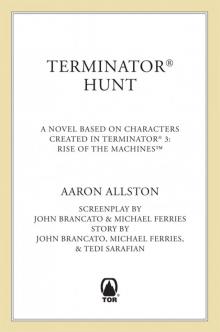 Terminator 3--Terminator Hunt
Terminator 3--Terminator Hunt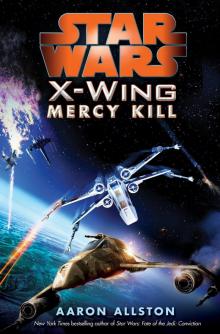 Mercy Kil
Mercy Kil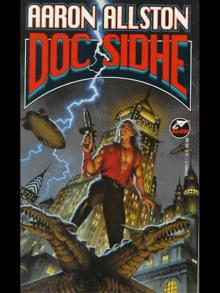 Doc Sidhe
Doc Sidhe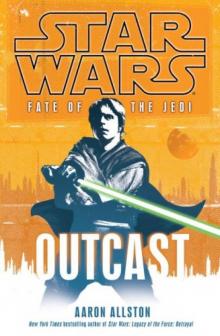 Star Wars: Fate of the Jedi: Outcast
Star Wars: Fate of the Jedi: Outcast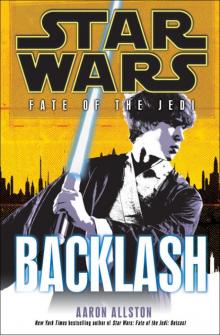 Fate of the Jedi: Backlash
Fate of the Jedi: Backlash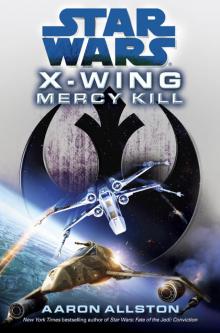 Mercy Kill
Mercy Kill Rebel Stand
Rebel Stand Wraith Squadron
Wraith Squadron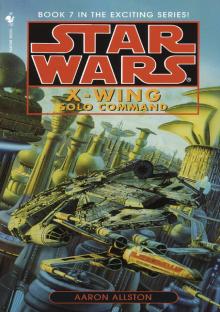 Star Wars: X-Wing VII: Solo Command
Star Wars: X-Wing VII: Solo Command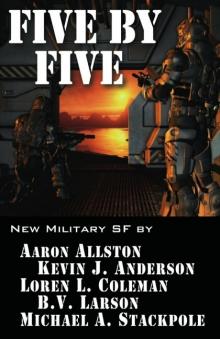 Five by Five
Five by Five Solo Command
Solo Command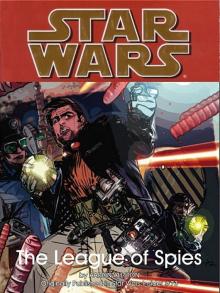 Star Wars: The Clone Wars Short Stories: The League of Spies
Star Wars: The Clone Wars Short Stories: The League of Spies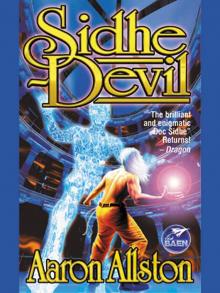 Sidhe-Devil
Sidhe-Devil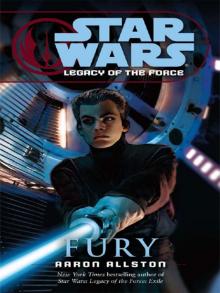 Star Wars: Legacy of the Force: Fury
Star Wars: Legacy of the Force: Fury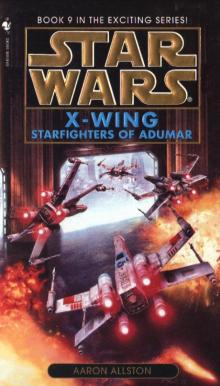 Starfighters of Adumar
Starfighters of Adumar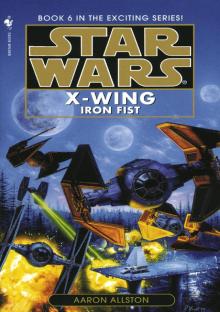 Star Wars: X-Wing VI: Iron Fist
Star Wars: X-Wing VI: Iron Fist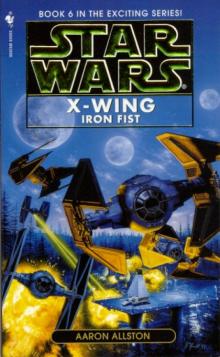 Star Wars - X-Wing - Iron Fist
Star Wars - X-Wing - Iron Fist Exile
Exile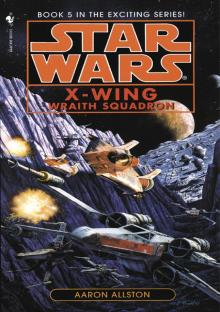 Star Wars: X-Wing V: Wraith Squadron
Star Wars: X-Wing V: Wraith Squadron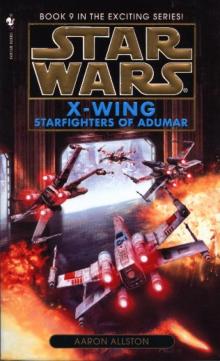 Star Wars - X-Wing - Starfighters of Adumar
Star Wars - X-Wing - Starfighters of Adumar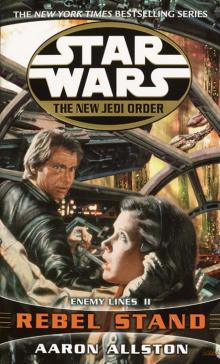 Rebel Stand: Enemy Lines II
Rebel Stand: Enemy Lines II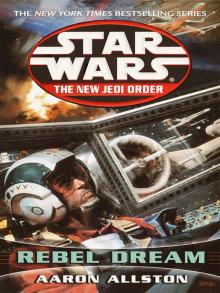 Rebel Dream: Enemy Lines I
Rebel Dream: Enemy Lines I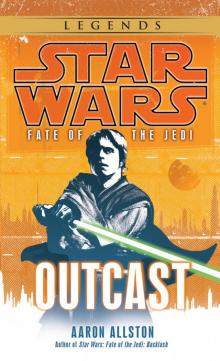 Outcast
Outcast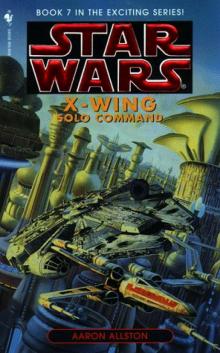 Star Wars - X-Wing 07 - Solo Command
Star Wars - X-Wing 07 - Solo Command